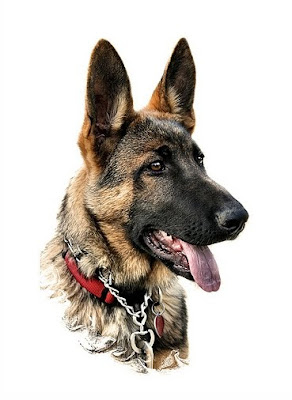Purely Genetic Traits in German Shepherd Dog: German Shepherd Dog Character
Genetic Traits in German Shepherd Dog
Some of the character traits in German Shepherd Dogs are purely genetic. Just like the components like pigments, anatomy etc. are engineered into the dog genetically, so are these traits. Well bred GSDs have all positive traits in common. This post on character traits in German Shepherd Dogs is going to talk about the purely genetic traits in the breed - starting from the physical endurance to agility, distractibility and a few more!

Agility: Agility is another remarkable feature in German Shepherd Dog breed. Agility describes the total coordination of the dog, including its natural fastness. Reputed breeders keep the Agility trait in mind while breeding, so that the dogs natural tendency to pursue things with fastness and surefootedness is not spoiled.
Sharpness: Alike these traits, Sharpness is transferred genetically! This is why not all German Shepherds are equally sharp. Degree of Sharpness is how intensely he reacts to a stressful situation. It is also a by-product of his intelligence. For instance, if your Shepherd bites you for no apparent reason, and if he is sharp enough, he will immediately realize his fault. This will make him cool down to his normal status.
Feral Tendency: Feral tendency is a purely genetic trait, which is a tendency to revert to an animal in the wild. A well bred dog has a higher feral tendency and will act more intelligently than the other dogs. A dog with high degree of feral tendency can be more easily trained and acts more obediently during the period of stress and pain. Dogs with low feral tendency will mis-behave in stressful situation.
Distractibility: Distractibility is environmentally influenced genetic trait that describes the tendency of the dog to get distracted from its allotted work. High degree of distractibility trait means the dog is highly influenced by the environmental factors, which is not a desirable trait as it hampers the working ability of the dog. Remember, GSD is a working breed. Most well bred dog are have amore or less high degree of distractibility, but that doesn’t mean that dog is genetically weak. Most well bred dogs have the ability to maintain the competency, but hidden. All you need is to carry on a rigorously typical training session to make use of the competency and attentiveness hidden within them.
Dogfight Tendency: This is purely a genetic trait in German Shepherd Dog and other dog breeds also, but many canine behaviorists have defined it as a Genetic trait, based on environmental influences like distractibility. Most people seem to get confused with Dogfight trait, as this trait typically resembles closely with what we call “Fighting Drive”. Specialists have drawn a thin line to set Dogfight Trait apart from Fighting Drive. Dogfight trait is a genetic trait that describes a typical aggression towards other dogs, irrespective of breed, gender and age of the counterpart. I have seen dogs that are cool with strangers and even kids, but shows harsh aggression towards other dogs/ mongrels. The most important point of difference between the Fighting drive and Dogfight trait is that Fighting Drive mainly aims towards victory, where the looser, on showing submissive behavior, is released to escape. Dogs with the high degree of Dogfight trait aims at the victory, usually ending up with severe injury or even death in worst case. List of character traits in German Shepherd Dogs also includes Dogfight trait.
Sensory Threshold: Sensory threshold is a purely genetic trait in German Shepherd Dogs. This trait describes the level of stimulus that a given amount agitation can make the dog to respond. The dog may whine, scream or bark in response to agitation. This describes the amount of stimulus that makes the respond to agitation. Dogs with higher sensory threshold take longer time to respond to agitation; they handle such situation more intelligently. They usually have stronger character with higher feral tendency. Dogs with lower sensory threshold gets agitated easily, which in turn means they have lower Feral tendency.
Well, I have posted all the character traits in GSD in the three posts including this. The first two were respectively on Psychological + Physiological traits and psychological, but genetically based. Stay tuned… up next more interesting information about German Shepherd Dogs.


 Here are the details of the German Shepherd Dog character traits that are psychological, but physiologically based:
Here are the details of the German Shepherd Dog character traits that are psychological, but physiologically based:





















